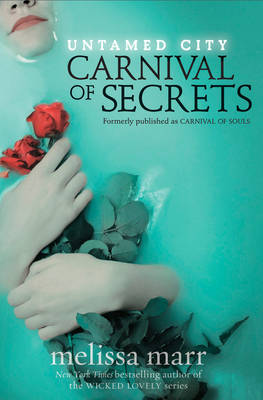Reviewed by Briana @ Pages Unbound on
In Carnival of Souls, Melissa Marr invites readers to The City, a world of violence and pleasure, where anything can be bought and sold. Except power. That is earned by birthright, or through fights to the death. Aya and Kaleb have entered the fight ring to win themselves a better life. Belias has entered to watch over Aya. And in a different world, the human world, teenage Mallory knows of none of this, or that everyone is The City is looking for her. Mallory wants only to be safe, to continue living in comfort with her adoptive witch father.
Marr drops readers straight into this intricate mess, where everyone is vying for power. Weapons may include fists, magic, or smarts, but everyone is playing the game to come out on top. Readers get to watch a whirlwind of alliances build and fall, and they may be several chapters into the book before they can get a firm grip on whom they may want to win. Marr guarantees that nothing is clear in her book, that no one is purely good or purely evil, so everyone must be given a chance.
In the end, “curs” Kaleb and Zevi came out as my favorite characters. They are the underdogs in City society, and Kaleb is striving hard to ensure he and Zevi will one day be able to live in comfort and safety. Their relationship as “pack” is also endearing. Though the two have completely diferent personalities and strengths, they are zealously loyal and protective of each other. It is refreshing to see two people so certain of each other, in a world where alliances seem more common than friendships, and just about everyone is out for themselves. If Kaleb does win the fights, one hopes he will able to teach some of the cur “pack” mentality to the masses.
Aya and Belias are also interesting characters, primarily because their relationship is so complex. They are less explicitly “nice” than Kaleb and Zevi, but Marr makes sure to give all her characters both positives and negative characteristics. No one in Carnival of Souls is one dimensional. That being said, Mallory, the ostensible protagonist, is the blandest character readers are presented with. She was raised in the human world, so that certainly makes her less “flashy” than some of the other characters, but she is also generally close-minded and fixated on her personal safety. (Ok, ok, that is a direct result of her upbringing, so it is logical in the context of the story and not at all her fault.) The point is, if she does not experience some serious character development in the rest of the series, she will remain my least favorite character, no matter how much everyone else in the book is obsessed with her.
The outlook for Mallory’s personal growth seems good, however. In Carnival of Souls, at least, Marr was focused more on building atmosphere and characters than on plot. The book was essentially a 300 page introduction to the world of The City and the major players. And, if not for the fairly original setting in the Carnival of Souls itself, the book would have read a lot more like an average paranormal romance: Girl does not know she is special. Girl meets mysterious dangerous boy. Instalove happens. Girl rebels against instalove but is still interested. Girl learns she is an important person and romance is threatened. End of book one. The sequel to Carnival of Souls has more plot potential, as the novel ends with an explicit goal for the characters to pursue, but I can imagine it sill meandering about, looking into the personal troubles of the characters—which may end up as the more interesting part.
In the end, however, I thought Carnival of Souls had a lot of potential it did not quite live up to. The setting is a huge draw, but the alluring/dangerous carnival idea has been more fully developed in other novels. I would have liked a little more description to draw me into the world. Also, Marr goes to great lengths to portray the complexity of The City society, but she “tells” a lot more than she “shows,” having her characters deliver direct statements about how no one is good or bad because of their species, their class, etc. Readers could draw such conclusions on their own, based on the actions of Marr’s characters.
I enjoyed Carnival of Souls, but I was not wowed by it, which was a reaction I anticipated after seeing tons of gushing reviews. I would like to continue the series because I want to see what happens to some of the great characters Marr has created, and I do believe the romance has the potential to be very sweet. I am less invested in the overarching plot. This is a good book, but not a great one.
Reading updates
- Started reading
- 27 January, 2014: Finished reading
- 27 January, 2014: Reviewed
